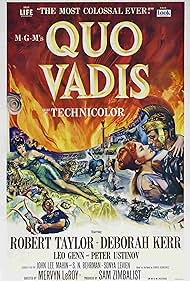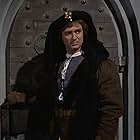Durante o reinado do insano e sanguinário imperador romano Nero, um tribuno romano, se apaixona perdidamente por uma jovem cristã, mas o romance é prejudicado por intrigas.Durante o reinado do insano e sanguinário imperador romano Nero, um tribuno romano, se apaixona perdidamente por uma jovem cristã, mas o romance é prejudicado por intrigas.Durante o reinado do insano e sanguinário imperador romano Nero, um tribuno romano, se apaixona perdidamente por uma jovem cristã, mas o romance é prejudicado por intrigas.
- Indicado a 8 Oscars
- 4 vitórias e 10 indicações no total
- Phaon
- (as D. A. Clarke-Smith)
Enredo
Você sabia?
- CuriosidadesIn his memoirs, "Dear Me" (1981), Sir Peter Ustinov recalled that MGM had sought him for the role of Emperor Nero but dithered for months, refusing to commit. During this time, he received numerous telegrams from the studio, one of which stated that they were concerned that he might be too young to play the notorious Roman Emperor. Ustinov replied that Emperor Nero died when he was thirty, and that if they waited much longer, he'd be too old. The studio cabled back: "Historical research has proved you correct. You have the part." Coincidentally (or not), Ustinov was 30 years old when this movie was released.
- Erros de gravaçãoMarcus Vinicius is angry because the Emperor will not allow him to bring his legion into the city of Rome. Since the early days of the Republic a military commander was forbidden to bring his troops armed into the city of Rome.
- Citações
Petronius: [in his dying letter to Nero] To Nero, Emperor of Rome, Master of the World, Divine Pontiff. I know that my death will be a disappointment to you, since you wished to render me this service yourself. To be born in your reign is a miscalculation; but to die in it is a joy. I can forgive you for murdering your wife and your mother, for burning our beloved Rome, for befouling our fair country with the stench of your crimes. But one thing I cannot forgive - the boredom of having to listen to your verses, your second-rate songs, your mediocre performances. Adhere to your special gifts, Nero - murder and arson, betrayal and terror. Mutilate your subjects if you must; but with my last breath I beg you - do not mutilate the arts. Fare well, but compose no more music. Brutalize the people, but do not bore them, as you have bored to death your friend, the late Gaius Petronius.
- Versões alternativasThe DVD release restores the original overture and exit music, which, up until that point, was only heard in the original roadshow release and in the 1964 roadshow re-release.
- ConexõesEdited into Atlântida, Continente Desaparecido (1961)
It's also the first of the big budget sand and scandal epics that the movies made to try and compete with that little home entertainment machine that was popping up in more and more homes. MGM built the magnificent sets the film was done on and sent Robert Taylor, Deborah Kerr and the whole cast over to Italy to shoot it. Those sets later popped up in Ben-Hur, The Fall of the Roman Empire and dozens of Italian gladiator films. Supposedly somewhere in the cast of thousands both Elizabeth Taylor and Sophia Loren appeared as extras. Spot them if you can.
Another extra was Lia DiLeo and gossip about her and Robert Taylor led to the break up of the Robert Taylor-Barbara Stanwyck marriage.
The story is about Robert Taylor as Marcus Vinicius, Roman soldier and his lust then love for Christian girl Lygia played by Deborah Kerr. Their story is set against the background of the early Christian church in Rome and the persecution of it by the Emperor Nero.
Taylor and Kerr are fine in the leads, but in this case the supporting cast really overshadowed the stars. Peter Ustinov as Nero and Leo Genn as Petronius were both nominated for Best Supporting Actor of 1951, but lost to Karl Malden in Streetcar Named Desire.
Peter Ustinov got a once in a lifetime part as Nero. It's the kind of role that one can overact outrageously and still convey all the sinister impulses that this villain possessed. Ustinov was compared with Charles Laughton as Nero in The Sign of the Cross and I wouldn't dare say who was better.
My favorite part in this film has always been Leo Genn as Gaius Petronius. He's the only actor in the film who's holding his own with Ustinov. He's a pretty smart guy this Petronius, keeping his place at the court by flattery and guile. It's a bitter pill for him to swallow when after Nero burns Rome, the Rome he loves and has dedicated his life to. He could have prevented it by taking a righteous stand against the tyrant. But instead he played the cynic once too often and decides what he deems to be the only course of action open to him.
Finlay Currie is a strong and hearty, but aged St. Peter. My conception of St. Peter has always been that of Finlay Currie and in his youth that of Howard Keel in The Big Fisherman. Peter's a hands on kind of pastor used to hard work. After all he was a fisherman in his younger days and that certainly is outdoor work.
Whether people are confirmed Christians or not will depend on how they take this film. We all can certainly admire the spectacle and the talent of the players. And nobody questions the atrocities committed by Emperor Nero against the early Christians.
But at one point after Taylor realizes his love for Kerr, he makes what I consider a quite reasonable offer to allow her to continue in her faith and he'll even put up whatever kind of chapel on the house grounds for that purpose. Not so says Kerr, it's going to be all or nothing. That all or nothing attitude today has got a few people upset with organized religion for various reasons. But that's in the distant future from the First Century AD.
- bkoganbing
- 1 de dez. de 2005
- Link permanente
Principais escolhas
- How long is Quo Vadis?Fornecido pela Alexa
Detalhes
Bilheteria
- Orçamento
- US$ 7.623.000 (estimativa)
- Faturamento bruto mundial
- US$ 101.486
- Tempo de duração2 horas 51 minutos
- Cor
- Proporção
- 1.37 : 1
Contribua para esta página









































